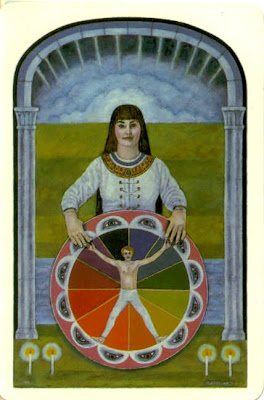Lunar Monday: Wheel of Fortune

The Mother Who Determines Experience
The Wheel of Fortune has been generally accepted to mean fate, to mean chance and, especially, to mean good fortune--because of its traditional assignment to Jupiter, a broadly benevolent planet. Those may not believe in astrology should at least be aware that the same medieval society which created Tarot, and which lacked a psychologically descriptive vocabulary, often used planets to represent types of behaviour and personalities. So, it may be assumed that the inventors of The Wheel of Fortune intended that we interpret it in positive Jupiterian [Jovial] terms.
However in the Jungian Tarot deck, the emphasis on good fortune has been expanded to suggest a wide range of experience. Unlike the card's design in any previous deck, a female figure is shown behind a wheel to which a youthful male figure is attached. This represents one of the most significant contributions of Jungian psychology: it shows the Mother who determines the experience of the Son. In other words as conscious and unconscious move closer together, toward the formation of something new (self-awareness, the Son), consciousness acts on the experiences generated by the unconscious.

...The wheel is divided into twelve sections suggesting each of the signs of the Zodiac as a discrete and different form of life experience. The principle is that the Mother determines the trials, pains, and pleasures of the Son by turning the circle which, in Jungian Psychology means Self. Twelve eyes around the circumference refer to the vision of Ezekial and thus relates The Wheel of Fortune to The Chariot.

For many, conversation with the Mother who is in control, may recall difficult and painful personal experience--haunting and unresolved vestiges of childhood which the figure will help to resolve.


Comments